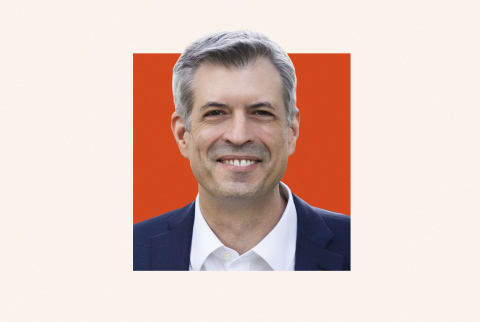Advertisement
3 Psychiatrist Tips To Manage Dopamine & Have Successful Relationships


According to psychiatrist Daniel Lieberman, M.D., author of The Molecule of More, we're all pretty terrible at managing our dopamine. Now, you may know dopamine as the "happy hormone" responsible for the pleasure centers in your brain—you're not wrong, but that's not all dopamine does. "Dopamine has a much broader role, and that is to orient us to the future," Lieberman shares on this episode of the mindbodygreen podcast. "It's about maximizing the future and making the future better than it is today." And that, folks, is where most of us fall short.
"We've gotten so good at the future that we've lost our ability to be happy and fulfilled in the present," he continues. And being fully present is the foundation of long-lasting, successful relationships—familial, platonic, and romantic. Below, Lieberman offers his tips to better manage your dopamine and, in turn, save your relationships:
Practice mindfulness.
Full disclosure: Lieberman has nothing against dopamine! "Dopamine does wonderful things," he says. "Dopamine gives us desire. It gives us passion. It gives us energy and motivation, and it can be incredibly fulfilling to go out under the influence of dopamine and work for the things that we want." The problem arises when you can't get off the dopamine train—when you're always striving for the next best thing, whether it's physical items, experiences, or relationships.
"We've got to come out of dopamine [and] into the here and now to enjoy the things that we have," he explains. "We've gone too far with always trying to make the future better, and we need to spend a little bit more time in the present moment. And that's what mindfulness is all about. Mindfulness is the precise opposite of dopamine—it's being in the here and now."
Mindfulness doesn't have one set definition: There are plenty of things you can do to stay mindful and present (meditation, stretching, deep breathing, etc.), but if you don't know where to start, perhaps begin a mindfulness journal. Here are some prompts to get you into a mindful head space.
Tweak your relationship with technology.
Technology is an incredible tool to stay connected to loved ones—but it also has the potential to harm your relationships. See, as you enter the vast world of social media, it inherently takes you out of the present moment. "So much about technology is about trying to get those dopaminergic hits of, 'Wow, this might make my future better.' And so we're less likely to be focused on the here and now," notes Lieberman.
There are ways to use technology mindfully, sure, but according to Lieberman, it's important for us to recognize the limitations of technology when it comes to true, honest connection. "Science and technology have seduced us into the mistaken notion that they can provide everything that we need. And that's absolutely not true because what we really need has nothing to do with science and technology," he says.
"What we really need are things like friendship, love, meaning, and art. What we need are magic moments in life when we feel that we are living at, at the top of our existence. And these magic moments don't come from new big-screen TVs. They don't come from the latest cellphone. They come out of the blue when we least expect it, and suddenly we realize what it feels like to be alive." We couldn't have said it better ourselves.
Understand passion.
As Lieberman previously mentioned, dopamine is what gives us passion. Passionate love, in particular, is a dopaminergic experience. It's a wonderful thing, but it doesn't last forever—and that's OK. "On average, it lasts about 12 months, and then no matter what we do, it starts to fade," Lieberman says. "A lot of people make the mistake of confusing the end of passionate love with the end of the relationship, and they say, 'Oh my God, I've fallen out of love with this person. I need to find someone else.'" Then they hop aboard what's known as the "hedonic treadmill," where they are constantly searching for passionate love.
"That's not a recipe for happiness," adds Lieberman. See, passionate love doesn't exactly fade. It just transforms into something else: companionate love. "It's not a dopaminergic thrill of excitement and anticipation," says Lieberman. "It's more of a here-and-now phenomenon of fulfillment, satisfaction, and contentment. It's just that deep feeling of being happy and content with someone whose life is intertwined with your own, and you know that they've always got your back. And in some ways, that's a more enjoyable kind of love than the [intensity] of passionate love."
Understanding how passionate love shifts over time is crucial for a healthy, successful relationship; on the flip side, always chasing the dopamine that comes with passionate love won't result in true companionship.
The takeaway.
According to Lieberman, the key to successful relationships (no matter what kind) is the ability to manage your dopamine and remain in the present. "Relationships are what being human is all about. Relationships are the single most important thing in our lives," he says, so it's important to make sure your connections have quality staying power.
We hope you enjoy this episode! And don't forget to subscribe to our podcast on iTunes, Google Podcasts, Spotify, or Amazon Music!
Watch Next
Enjoy some of our favorite clips from classes
Enjoy some of our favorite clips from classes
What Is Meditation?
Mindfulness/Spirituality | Light Watkins
Box Breathing
Mindfulness/Spirituality | Gwen Dittmar
What Breathwork Can Address
Mindfulness/Spirituality | Gwen Dittmar
The 8 Limbs of Yoga - What is Asana?
Yoga | Caley Alyssa
Two Standing Postures to Open Up Tight Hips
Yoga | Caley Alyssa
How Plants Can Optimize Athletic Performance
Nutrition | Rich Roll
What to Eat Before a Workout
Nutrition | Rich Roll
How Ayurveda Helps Us Navigate Modern Life
Nutrition | Sahara Rose
Messages About Love & Relationships
Love & Relationships | Esther Perel
Love Languages
Love & Relationships | Esther Perel
What Is Meditation?
Box Breathing
What Breathwork Can Address
The 8 Limbs of Yoga - What is Asana?
Two Standing Postures to Open Up Tight Hips
How Plants Can Optimize Athletic Performance
What to Eat Before a Workout
How Ayurveda Helps Us Navigate Modern Life
Messages About Love & Relationships
Love Languages
Advertisement

The 4 Pillars That Lead To Long-Lasting Relationships, From A Marriage Counselor
Rachel Glik, Ed.D., LPC

The 4 Pillars That Lead To Long-Lasting Relationships, From A Marriage Counselor
Rachel Glik, Ed.D., LPC









